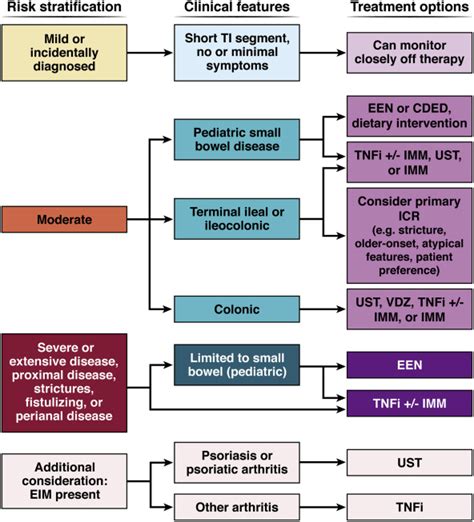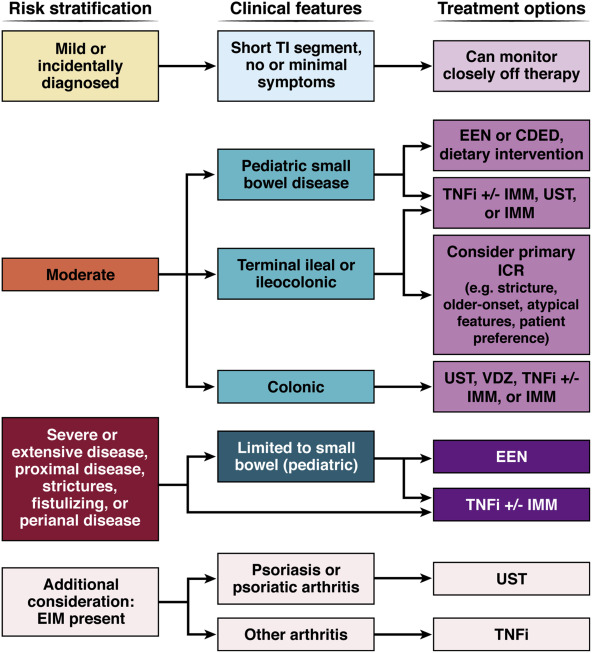Crohn’s disease is a chronic inflammatory condition that can significantly impact the digestive tract and overall health. Effective management and treatment are essential to control symptoms, prevent complications, and improve the quality of life for those affected. This comprehensive guide delves into the crucial aspects of Crohn’s disease treatment, from understanding how the disease affects the body to exploring personalized treatment plans, medications, and the role of surgery. Additionally, it highlights the importance of diet, lifestyle changes, and emerging therapies in achieving remission and long-term management. Early intervention and tailored approaches are key to living well with Crohn’s disease.
Join xishoot.xyz as we delve deeply into this topic.
1. Why Treatment is Crucial: Importance of early intervention and ongoing treatment to prevent complications and improve quality of life.
Crohn’s disease is a lifelong condition that, if left untreated, can lead to serious complications and a decline in quality of life. Early intervention is crucial in managing this disease, as it helps to control inflammation, minimize symptoms, and reduce the risk of severe outcomes such as bowel obstructions, fistulas, and malnutrition. By starting treatment early, patients can avoid many of the long-term consequences that might arise from unchecked disease progression.
Ongoing treatment is equally important, as Crohn’s disease is characterized by periods of flare-ups and remission. Continuous management helps to maintain remission, prevent flare-ups, and minimize the impact of the disease on daily life. Without consistent treatment, the inflammation caused by Crohn’s can damage the digestive tract over time, leading to more complex and difficult-to-treat conditions.
Furthermore, early and ongoing treatment can improve a patient’s overall quality of life. Effective management of Crohn’s disease allows individuals to maintain a more active lifestyle, avoid hospitalizations, and reduce the need for invasive surgeries. It also helps in managing the emotional and psychological toll that comes with living with a chronic illness. Ultimately, a proactive approach to treatment is essential for minimizing complications, enhancing life expectancy, and ensuring that individuals with Crohn’s disease can lead fulfilling lives.

2. How Crohn’s Disease Affects the Body: Overview of the impact on the digestive tract and potential long-term effects if left untreated.
Crohn’s disease primarily affects the digestive tract, causing inflammation that can occur anywhere from the mouth to the anus, but it most commonly targets the small intestine and the beginning of the colon. This inflammation can lead to a range of symptoms, including abdominal pain, diarrhea, fatigue, and weight loss. Over time, the chronic inflammation can cause significant damage to the digestive tract, leading to complications such as strictures (narrowing of the intestines), fistulas (abnormal connections between different parts of the intestine or between the intestine and other organs), and abscesses.
If left untreated, Crohn’s disease can have severe long-term effects beyond the digestive system. Nutrient malabsorption due to damaged intestines can lead to malnutrition, anemia, and bone density loss. The disease can also increase the risk of colon cancer and cause other systemic issues like skin disorders, joint pain, and eye inflammation. The cumulative impact of these complications underscores the importance of timely and effective treatment to prevent irreversible damage and preserve overall health.

3. What to Expect from a Treatment Plan: Typical components of a comprehensive treatment plan, including medication, lifestyle changes, and monitoring.
A comprehensive treatment plan for Crohn’s disease is tailored to manage symptoms, reduce inflammation, and achieve long-term remission. The plan typically includes a combination of medications, lifestyle adjustments, and regular monitoring to address the complexities of the disease.
Medications are often the cornerstone of treatment, with options ranging from anti-inflammatory drugs like aminosalicylates and corticosteroids to immune system suppressors such as biologics and immunomodulators. These medications work to control inflammation, relieve symptoms, and prevent flare-ups. Depending on the severity of the disease, patients may need a single medication or a combination to effectively manage their condition.
Lifestyle changes play a crucial role in supporting the medical treatment. Patients are often advised to follow a specific diet to avoid triggering symptoms, incorporate regular exercise, and manage stress, which can exacerbate the disease. Dietary adjustments may include avoiding high-fiber foods during flare-ups, eating smaller, more frequent meals, and staying hydrated.
Monitoring is essential to track the effectiveness of the treatment plan and make necessary adjustments. This typically involves regular check-ups with a gastroenterologist, routine blood tests, imaging studies, and possibly endoscopic procedures. Ongoing monitoring helps to catch any complications early and ensures that the treatment plan remains effective in managing Crohn’s disease over time.

4. Why Personalized Treatment Matters: The need for tailored treatment plans based on individual symptoms, disease severity, and patient preferences.
Personalized treatment is crucial in managing Crohn’s disease because no two patients experience the condition in exactly the same way. The severity of symptoms, the specific areas of the digestive tract affected, and how the disease progresses can vary widely among individuals. A one-size-fits-all approach to treatment is often ineffective and can lead to suboptimal outcomes.
Tailored treatment plans consider each patient’s unique symptoms, the extent of the disease, and their overall health. This personalized approach ensures that the chosen therapies, whether medications, dietary adjustments, or lifestyle changes, are the most effective for the individual’s specific situation. Additionally, patient preferences and lifestyle factors are taken into account, allowing for a treatment plan that aligns with their daily routines and goals.
By focusing on personalized treatment, healthcare providers can better manage the disease, minimize side effects, and improve the patient’s quality of life, ultimately leading to more successful long-term outcomes.
5. How Medications Work: Explanation of common medications used in Crohn’s disease, including their mechanisms, benefits, and potential side effects.
Medications are a critical component of managing Crohn’s disease, each working in different ways to control inflammation, relieve symptoms, and maintain remission. One of the most commonly used types of medication is aminosalicylates, which help reduce inflammation in the lining of the intestines. They are often used for mild to moderate cases and are generally well-tolerated, though they may cause side effects like nausea or headaches.
For more severe inflammation, corticosteroids may be prescribed. These drugs are powerful anti-inflammatories that can quickly reduce symptoms during flare-ups. However, long-term use is limited due to potential side effects like weight gain, bone thinning, and increased risk of infections.
Immunomodulators and biologic therapies are used to suppress the immune system’s overactive response, which causes the inflammation in Crohn’s disease. Immunomodulators, like azathioprine and methotrexate, help reduce the need for steroids and maintain remission but can increase the risk of infections and liver damage. Biologics, such as infliximab and adalimumab, target specific proteins involved in inflammation, offering more targeted treatment with fewer side effects but requiring regular injections or infusions.
Understanding how these medications work and their potential side effects is essential for effective, long-term management of Crohn’s disease.
6. What Role Surgery Plays: When surgery becomes necessary, types of surgical procedures available, and their effectiveness in managing Crohn’s disease.
While medications are often the first line of treatment for Crohn’s disease, surgery becomes necessary when these treatments are no longer effective or when complications arise. Surgery is not a cure for Crohn’s disease, but it can significantly improve quality of life by addressing specific issues such as obstructions, fistulas, abscesses, and severe inflammation that does not respond to medication.
Several types of surgical procedures are available, depending on the nature and location of the disease. Resection is one common procedure where the damaged portion of the intestine is removed, and the healthy ends are reconnected. This surgery can provide relief from symptoms and is often necessary when strictures (narrowing of the intestines) cause blockages.
Another procedure is strictureplasty, which widens a narrowed section of the intestine without removing any part of it. This option is useful for patients who have multiple strictures or who have already had significant portions of their intestines removed.
In some cases, patients may require an ostomy, where a part of the intestine is diverted to an opening in the abdominal wall, allowing waste to be collected in an external bag. This can be temporary or permanent, depending on the severity of the disease.
While surgery can be highly effective in managing Crohn’s disease, it’s typically viewed as a last resort after other treatments have failed. Even after surgery, ongoing medical treatment is usually necessary to prevent recurrence and manage symptoms.
7. Why Diet and Nutrition are Key: The importance of dietary management in reducing symptoms and maintaining remission, along with common dietary recommendations.
Diet and nutrition play a crucial role in managing Crohn’s disease, as they can significantly influence symptoms and overall health. While there is no specific diet that universally applies to all patients, effective dietary management can help reduce inflammation, alleviate symptoms, and maintain remission.
Common dietary recommendations include consuming a well-balanced diet rich in nutrients while avoiding foods that may trigger flare-ups. Many patients find it beneficial to limit high-fiber foods, such as whole grains, nuts, and raw fruits and vegetables, especially during active disease phases. Instead, a low-fiber diet with easily digestible foods may be recommended to minimize irritation in the digestive tract.
Staying hydrated is essential, particularly during flare-ups when diarrhea may lead to fluid loss. Additionally, some individuals may benefit from incorporating probiotics and prebiotics to support gut health. It’s important for patients to work closely with a healthcare provider or a registered dietitian to develop a personalized dietary plan that addresses their specific symptoms and nutritional needs, ensuring they receive adequate nutrition while managing their condition effectively.
8. How Lifestyle Changes Contribute to Treatment Success: The impact of stress management, exercise, and other lifestyle factors on managing Crohn’s disease.
Lifestyle changes are essential in managing Crohn’s disease and can significantly contribute to treatment success. Stress management is particularly important, as stress can exacerbate symptoms and trigger flare-ups. Techniques such as mindfulness, meditation, yoga, and deep-breathing exercises can help reduce stress levels and promote overall well-being.
Regular exercise is another vital component of a healthy lifestyle for those with Crohn’s disease. Engaging in moderate physical activity can improve mood, boost energy levels, and enhance digestive health. Activities such as walking, swimming, or cycling can be beneficial, but it’s crucial to listen to the body and avoid overexertion, especially during flare-ups.
Additionally, adequate sleep and maintaining a supportive social network can positively impact mental and emotional health. Prioritizing self-care, establishing a routine, and staying connected with family and friends can help patients cope with the challenges of living with a chronic illness.
By integrating these lifestyle changes into their daily routine, individuals with Crohn’s disease can create a more holistic approach to treatment, ultimately improving their quality of life and enhancing the effectiveness of their medical therapies.
9. What Emerging Therapies Offer: Overview of new and experimental treatments, including biological therapies and other cutting-edge approaches, and their potential benefits.
Emerging therapies for Crohn’s disease are offering new hope for patients, particularly those who have not responded well to traditional treatments. One of the most promising advancements in recent years is the development of biological therapies. These medications target specific components of the immune system involved in inflammation, providing a more tailored approach to treatment. Examples include agents like infliximab and adalimumab, which have shown significant effectiveness in reducing symptoms and achieving remission in many patients.
Additionally, small molecule drugs, such as tofacitinib, represent a new class of oral medications designed to inhibit specific pathways in the immune response. These treatments can be particularly beneficial for patients who prefer non-injection options.
Stem cell therapy is another experimental approach gaining attention. It involves using a patient’s own stem cells to reset the immune system, potentially offering a long-lasting solution to the disease.
Moreover, researchers are exploring the role of the microbiome in Crohn’s disease, investigating how manipulating gut bacteria could influence disease outcomes. These emerging therapies not only aim to improve symptom management but also focus on enhancing the overall quality of life, offering hope for a more effective and personalized approach to Crohn’s disease treatment in the future.
In conclusion, effectively managing Crohn’s disease requires a comprehensive approach that includes personalized treatment plans, dietary management, lifestyle changes, and emerging therapies. Early intervention and ongoing medical care are vital to prevent complications and improve quality of life. By understanding the impact of medications, the role of surgery, and the importance of nutrition and stress management, patients can better navigate their treatment journey. With advancements in medical research and tailored therapies, there is hope for improved outcomes and a better quality of life for those living with Crohn’s disease.
xishoot.xyz
